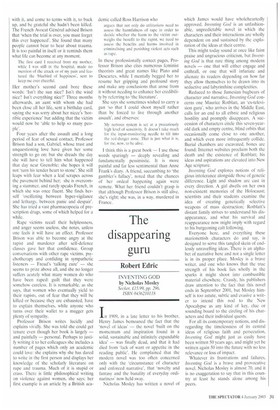The disappearing guru
Robert Edric
INVENTING GOD by Nicholas Mosley Seeker, £15.99, pp. 296, ISBN 0436210118 In 1909, in a late letter to his brother, Henry James bemoaned the fact that the 'novel of ideas' — the novel 'built on the momentum and inspiration found in a solid, sustainable and infinitely expandable idea' — was finally dead, and that it had died from 'lack of want or appetite in the reading public'. He complained that the modern novel was too often concerned only with the 'circumstance of character and enforced narrative', that 'novelty and fantasy and the banality of everyday ordinariness' now held sway.
Nicholas Mosley has written a novel of which James would have wholeheartedly approved. Inventing God is an unfashionable, unpredictable novel in which the characters and their interactions are wholly dependent on and sustained by the exploration of the ideas at their centre.
This might today sound at once like faint praise and ungracious criticism, but Inventing God is that rare thing among modern novels — one that will either engage and enthrall, or one that will infuriate and alienate its readers depending on how far they allow themselves to be drawn into its seductive and labyrinthine complexities.
Reduced to those Jamesian bugbears of character and narrative, Inventing God concerns one Maurice Rotblatt, an 'ex-television guru', who arrives in the Middle East, calls for an end to all ethnic and religious hostility and promptly disappears. A succession of characters circle this seven-yearold dark and empty centre, blind orbits that occasionally come close to one another, and which even more infrequently collide. Burial chambers are excavated, bones are found; Internet websites proclaim both the death and the existence of Rotblatt; his ideas and aspirations are elevated into New Age scripture.
Inventing God explores notions of religious intolerance alongside those of genetic difference. Light and shadow are cast in every direction. A girl dwells on her own non-existent memories of the Holocaust; scientists and their students examine the idea of creating genetically selective weapons of mass destruction; Rotblatt's distant family strives to understand his disappearance, and what his survival and reappearance now might imply with regard to his burgeoning cult following.
Everyone here, and everything these marionettish characters do and say, is designed to serve this tangled skein of endlessly unravelling ideas. There is an alphabet of narrative here and not a single letter is in its proper place. Mosley is a brave writer, and one who knows that the true strength of his book lies wholly in the sparks it might shoot into combustible material elsewhere. Crassly, his publishers draw attention to the fact that this novel ends in September 2001, but Mosley himself is too astute, subtle and evasive a writer to intend this nod to the New Apocalypse as any kind of key, clue or sounding board to the circling of his characters and their individual quests.
For all its contemporary notions, and disregarding the timelessness of its central ideas of religious faith and persecution, Inventing God might just as easily have been written 50 years ago, and might yet be written again 50 into the future with no less relevance or loss of impact.
Whatever its frustrations and failures, Inventing God is a brave and provocative novel. Nicholas Mosley is almost 70, and it is no exaggeration to say that in this country at least he stands alone among his peers.


















































 Previous page
Previous page